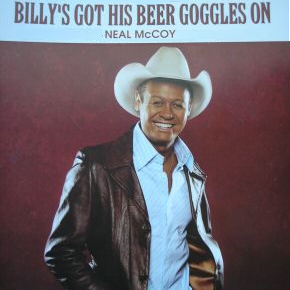Billy's Got His Beer Goggles On
Billy's Got His Beer Goggles On is a country music song that has garnered attention for its humorous take on the effects of alcohol consumption on perception, particularly in social settings. The song was released as a single and has since become a notable track within the country genre, often cited for its catchy tune and relatable lyrics.
Background[edit | edit source]
The concept of "beer goggles" refers to the phenomenon where alcohol consumption makes physically unattractive persons appear beautiful; the song plays on this idea with a light-hearted and comedic approach. It narrates the story of a man named Billy, who, after consuming alcohol, starts seeing the world and the people around him in a more attractive light. The term "beer goggles" itself has become a popular colloquialism, used to describe the altered state of perception caused by alcohol.
Lyrics and Composition[edit | edit source]
The lyrics of "Billy's Got His Beer Goggles On" are structured to take the listener through a typical night out for Billy, highlighting the humorous and often exaggerated effects of his beer goggles. The composition combines traditional country music elements with a lively tempo, making it a favorite in bars and clubs, as well as at country music festivals.
Reception[edit | edit source]
Upon its release, the song received positive feedback from both fans and critics. Its appeal lies not only in its humorous approach to a common social experience but also in its catchy melody and relatable storytelling. It has been praised for its ability to connect with the audience, making it a memorable and entertaining piece within the country music repertoire.
Impact[edit | edit source]
"Billy's Got His Beer Goggles On" has had a notable impact on popular culture, particularly in how it addresses the concept of beer goggles with humor and levity. It has inspired various forms of media, including parodies, and has been used in discussions about alcohol consumption and social perceptions. The song remains a popular choice for DJs and musicians, especially in settings where its theme is particularly relatable.
See Also[edit | edit source]
Search WikiMD
Ad.Tired of being Overweight? Try W8MD's physician weight loss program.
Semaglutide (Ozempic / Wegovy and Tirzepatide (Mounjaro / Zepbound) available.
Advertise on WikiMD
|
WikiMD's Wellness Encyclopedia |
| Let Food Be Thy Medicine Medicine Thy Food - Hippocrates |
Translate this page: - East Asian
中文,
日本,
한국어,
South Asian
हिन्दी,
தமிழ்,
తెలుగు,
Urdu,
ಕನ್ನಡ,
Southeast Asian
Indonesian,
Vietnamese,
Thai,
မြန်မာဘာသာ,
বাংলা
European
español,
Deutsch,
français,
Greek,
português do Brasil,
polski,
română,
русский,
Nederlands,
norsk,
svenska,
suomi,
Italian
Middle Eastern & African
عربى,
Turkish,
Persian,
Hebrew,
Afrikaans,
isiZulu,
Kiswahili,
Other
Bulgarian,
Hungarian,
Czech,
Swedish,
മലയാളം,
मराठी,
ਪੰਜਾਬੀ,
ગુજરાતી,
Portuguese,
Ukrainian
Medical Disclaimer: WikiMD is not a substitute for professional medical advice. The information on WikiMD is provided as an information resource only, may be incorrect, outdated or misleading, and is not to be used or relied on for any diagnostic or treatment purposes. Please consult your health care provider before making any healthcare decisions or for guidance about a specific medical condition. WikiMD expressly disclaims responsibility, and shall have no liability, for any damages, loss, injury, or liability whatsoever suffered as a result of your reliance on the information contained in this site. By visiting this site you agree to the foregoing terms and conditions, which may from time to time be changed or supplemented by WikiMD. If you do not agree to the foregoing terms and conditions, you should not enter or use this site. See full disclaimer.
Credits:Most images are courtesy of Wikimedia commons, and templates Wikipedia, licensed under CC BY SA or similar.
Contributors: Prab R. Tumpati, MD

